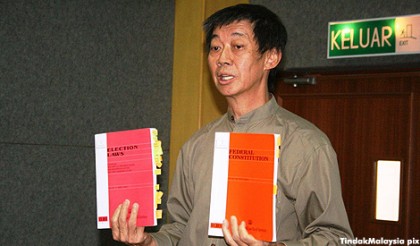The Malaysian Electoral Reform Programme (MERP) launched last month by the civil society group Tindak Malaysia (TM) was initially intended for Bersih’s use, TM founder Py Wong has told the New Mandala.
Bersih’s refusal to adopt the MERP left Py “shocked,” who argued the MERP provides a comprehensive outlook on electoral reform which “goes beyond Bersih.” But Bersih spokesperson Wong Chin Huat has responded saying that the movement has reservations on some aspects of the MERP, and that time constraints were a factor in not adopting the MERP.
Py founded the TM website in 2008, intending it to be a “library” of sorts: “Politics is a long, drawn-out process. It’s not possible to remember everything, so if I see something of interest, I’ll put it on TM.” He had been working as a businessman in Brunei when Anwar Ibrahim was sacked as Deputy Prime Minister, and felt it was his “duty” to come back as he realized that “no Malaysian is safe.”
Back in Malaysia, Py took it upon himself to learn as much as he could about the country’s political situation. When he felt he had “learnt enough”, he set up TM the year after the first Bersih rally.
Despite their shared vision of electoral reform, Py said there are differences in approaches by the two organisations, describing TM as more “reclusive”: “We (feel) that there are people who can be effective in protesting, and we feel that we can work more effectively if we use our brains and strategise.”
TM, Py says, nonetheless remains supportive of Bersih’s work. In an email to the New Mandala, Chin Huat described TM as a “member and a partner” of the Bersih coalition, and noted that the two had collaborated together on a number of occasions. The Bersih website has a link to TM’s PACABA (Polling Agent/Counting Agent/Barung Agent or booth observer) training program, an initiative Py started in 2010 with a view to increase transparency in the voting process.
However, TM felt that Bersih’s goals were “too loose”, and, while “good for slogans”, did not specifically address flaws in the electoral system – “you can drive a truck through the eight demands,” said Py. TM then took the initiative to draft the MERP – a process which Py said took over a year and was done in consultation with a team of lawyers.
The MERP has some 19 demands compared with Bersih’s eight demands. These demands are grouped under five categories – “institutional reform”, “clean the electoral roll”, “fair election process”, “transparent elections roll-out”, and “ethics and integrity.”
It also recommends 204 legislative amendments as a part of its implementation – including randomizing ballot papers and restructuring MP distribution among the states – but says that six of its goals can be adopted immediately without the need for legislation. The MERP, Py argued, provided a definitive course of action to address local electoral flaws.
With the country’s 13th general elections – which Bersih has already said it expects to be the country’s dirtiest yet – due soon, Py said that TM worked hard to get the MERP ready to be adopted by Bersih quickly. “We told them right from the beginning – we are doing this for you,” Py said. But according to Py, when he presented the MERP to Bersih, he was told to drop it until after the elections.
“Then we went back and we said, if you want to negotiate with the politicians, you have to do it now, before the elections. After the elections, they won’t have time for you.”
In an email to the New Mandala, Chin Huat explained that while the MERP was “very extensive”, Bersih had some reservations on some of its contents. Whilst welcoming discussion on the issues the MERP raised, Bersih decided it covered too many aspects.
“Legally, we hold that the drafting and revision of laws are very complicated and one needs to look at all relevant laws,” he wrote. He added that Bersih was uncertain it would have the time and energy to do so before the elections.
Chin Huat also expressed concern that the randomization of ballot papers would “complicate” the voting process, “when it may already take longer time due to indelible ink”, and that the proposal to randomize ballot papers for overseas voters was “unrealistic.” Chin Huat, who researches electoral systems, also wrote that the delineation of constituencies needed more discussion, citing the need to prevent gerrymandering.
Ultimately, Py said, TM could not agree to wait on the MERP, and so, despite their self-confessed aversion to publicity, launched the platform at a press conference last month. The response so far has been fairly positive, with Py citing publicity in Malaysia Today and the Selangor Times, from popular radio personality Patrick Teoh, and also some responses on the social networking site Facebook.
He has even been invited to do regular shows on the topic of electoral reform on one local radio station. “This is something the public must know,” he said, as the discussion on just how to reform the electoral system in Malaysia throws out more food for thought.
 Facebook
Facebook  Twitter
Twitter  Soundcloud
Soundcloud  Youtube
Youtube  Rss
Rss 